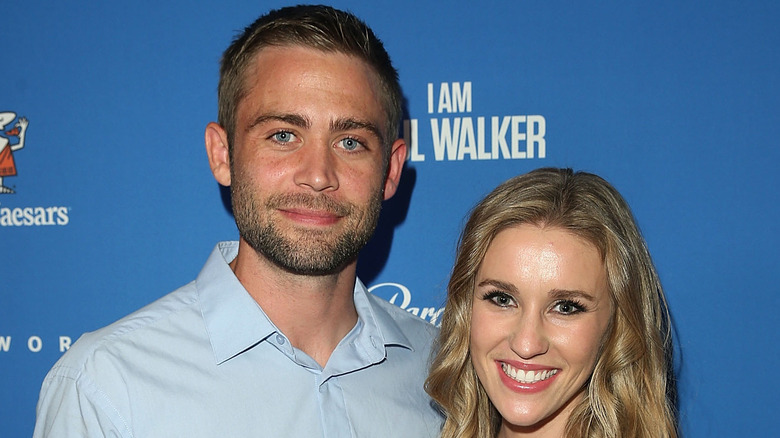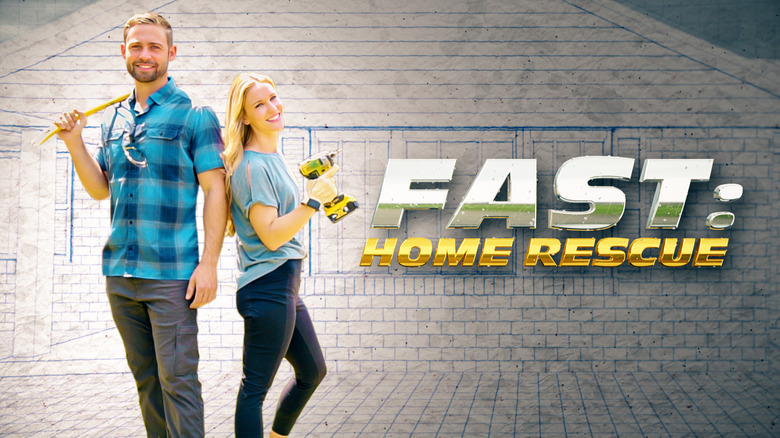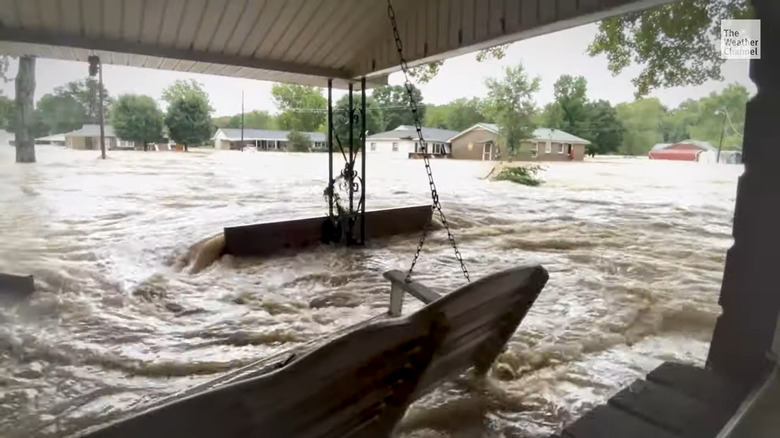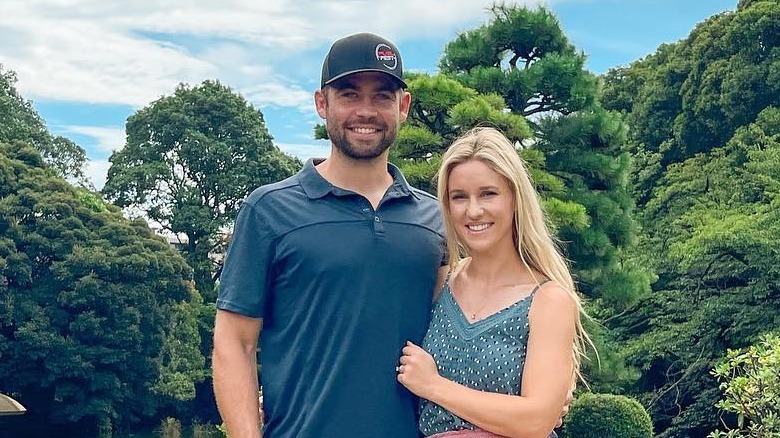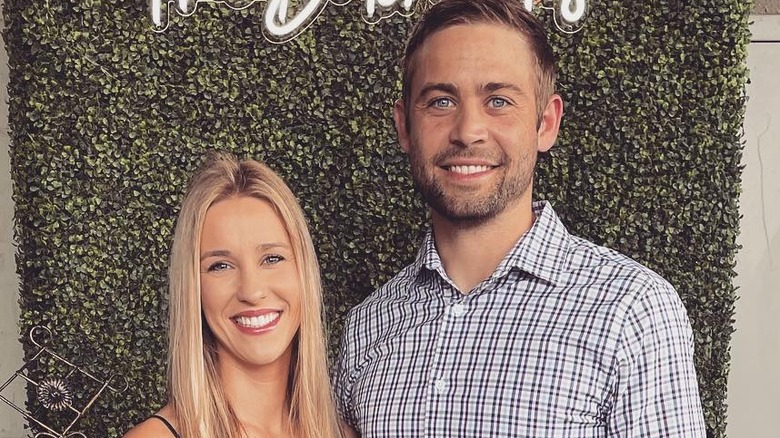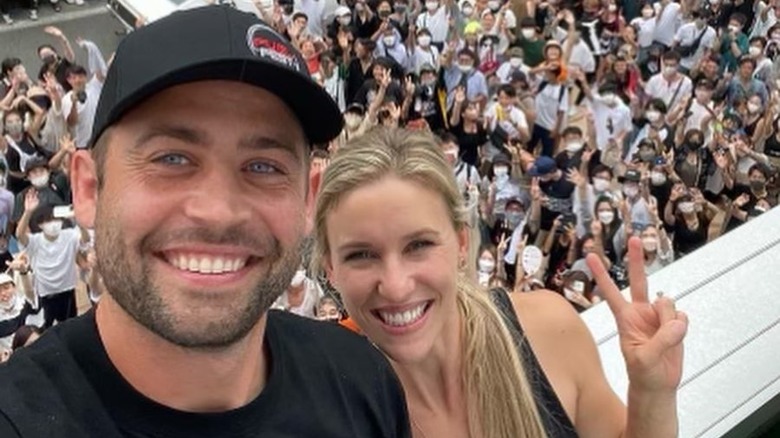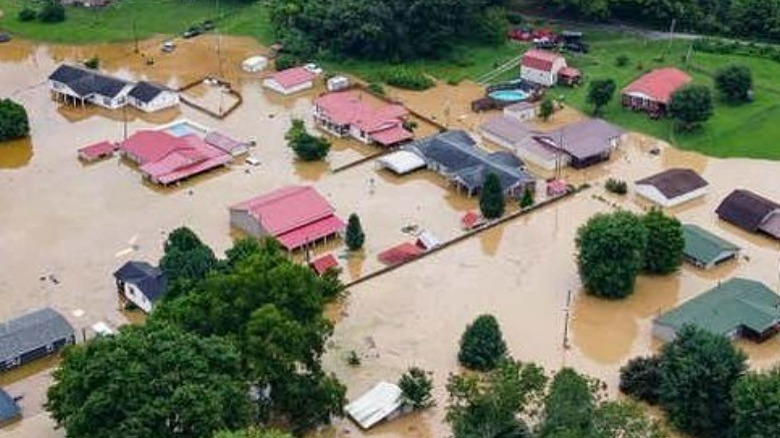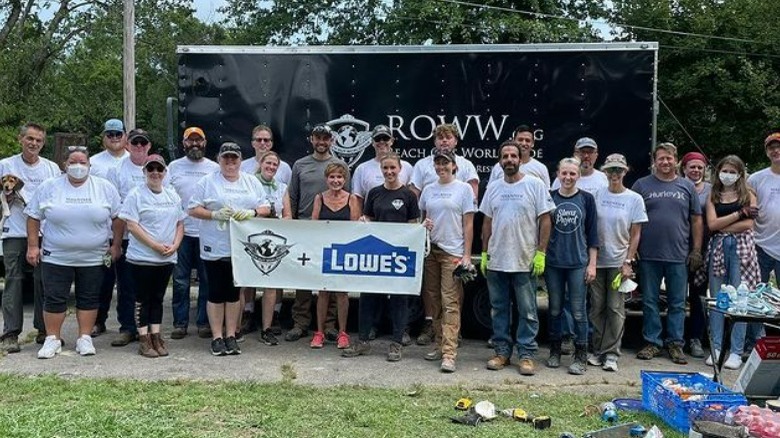Cody And Felicia Walker On Disaster Relief With Fast: Home Rescue - Exclusive Interview
No matter how much time, money, and labor you spend constructing a home, there is one uncontrollable, destructive force that can threaten to destroy it all — natural disasters. Every year, countless homes are wrecked by tornadoes, hurricanes, fires, flooding, and more. In their wake, families are left without their homes for who knows how long.
This problem is precisely what Cody and Felicia Walker aim to tackle in their new show, "Fast: Home Rescue." The Walkers are the heads of Reach Out Worldwide (ROWW), a nonprofit founded by "Fast and Furious" star Paul Walker that aids those impacted by natural disasters, helping clean up the destruction, providing clean water, and more. In this The Weather Channel original series, Cody and Felicia will partner with ROWW as they build homes for families in crisis in just five short days.
In an exclusive interview with House Digest, Cody and Felicia sat down to tell us all about the show, the principles and mission of ROWW, and how homeowners can both prepare for and respond to natural disasters.
What is 'Fast: Home Rescue' about?
To begin, can you talk a little bit about the show?
Cody Walker: It follows Reach Out Worldwide, which is a nonprofit organization that my wife and I run together. It was founded by my brother, Paul Walker. The organization renovates the homes of deserving families that have had their homes destroyed by disasters such as hurricanes, tornadoes, floods, [and] fires. We have a week to renovate the home for them and get them back into their house.
For Cody, how was it going from a traditional acting and filming environment to a more organic, reality based one? For Felicia, how was it to be in front of a camera crew?
Cody: Honestly, it was a lot more fun getting to be myself and not having to remember lines or get in the mindset of a character — it was a big relief. You don't have to prep all of that stuff. This is reality. You're living in the moment, you're getting the work done. You're saying what needs to be said in the way that you would say it because you're being yourself. It was very fun. To be able to do it alongside my wife and the Reach Out Worldwide volunteers and the crew and everything, it was a fun experience. It was a lot of hard work, but it was a lot of fun. I prefer it.
Felicia Walker: It was definitely a new experience for me. Everything, typically, that I do is behind the scenes. Cody and I work side-by-side in pretty much everything that we do. We also have an automotive festival series that we produce called FuelFest, and Cody's the face of that. With Reach Out Worldwide, he's been the face of that, and he tends to be the one in front of the camera and I'm the one behind the scenes doing the other stuff.
It was a totally new experience for me. Because I'm already so involved with Reach Out Worldwide and really close with the team already and this is what we do on a regular basis, it wasn't hard. It was a little nerve-wracking, going into it. [By] the first day, it was like another day on the job site.
How the show aims to raise awareness for ROWW
Can you both tell me a little bit about Reach Out Worldwide, and how you aim to carry out the original mission through the show?
Felicia: When we were approached to do this show, it was very important to us that we stayed true to the mission of the organization. This is going to be broadcast nationally — internationally, possibly. Our donors are watching, our volunteers are watching, our fans are watching. It's very important to us that we stay true to that mission. What Paul would want for the organization is something that we always have in the back of our mind, but it's developed over the last 10 years.
Reach Out Worldwide funded these builds, all of the construction for it, so it was critical that when we're choosing families and we're doing the design for the build itself, that we're choosing families and work that ROWW would be doing even if the cameras weren't there. It was important to us to vet the families, know their story, know their needs, [and] make sure that it made sense for ROWW to do, even if the cameras weren't there. We did a good job of that. We're proud of all the work that we did over these last 12 weeks. I know Paul would be impressed and we've definitely stayed true to the mission of the organization through this.
The time limit challenge
Has filming your process and work through ROWW changed it at all? Has the time limit challenged you, or given you new insight on the home building process?
Felicia: Totally. We've never done a four day build before. ROWW is used to coming in immediately after a disaster and mucking and gutting or clearing trees or whatever that may be. We probably do a couple houses a day just to do the debridement work. Sometimes, if we're just doing chainsaw work, we'll hit multiple homes a day, but we're not so used to rebuilding. We've done it, we've done a couple of them and we really liked it.
We knew we wanted to start doing more of that, because it makes such a bigger impact on the people that we're serving. It's a long term impact that we can make in doing this, but it was a huge challenge. None of our team had ever done anything like this before [so quickly].
Cody: We had to bring on additional help to do this. ROWW typically helps clean up the disaster and the mess so that the homeowner can begin the rebuild process. What was really fun about this opportunity with the show is, in most of the episode, we are actually going back to the same town or in some cases the very same house that we helped clean up and we're now getting to return and rebuild. What's been really neat about this opportunity with The Weather Channel is being able to get a house all the way across the finish line, not just help them get to the point where they're ready to rebuild.
Not to take away from that at all — ROWW deconstruction [typically] saves homeowners tens of thousands of dollars. Homeowners, in many cases, are left with a huge bill if you have to muck out a house that's flooded, if you have to take walls down and deconstruct things because the tree fell through your home and you don't have the proper insurance coverage,. Or your insurance company went belly-up because of the amount of claims, because the disaster was so large.
There's a lot of people that need help out there, so it's really neat to be able to take it all down and build it all back up again — which is the big highlight of the show, the rebuild process. It's been really fun.
Have a disaster relief plan
What advice do you have for people looking to disaster-proof their home? What is a common misconception people have about disaster proofing?
Felicia: It totally varies by case and by location. Depending on what storm you're talking about, fireproofing and hurricane-proofing are totally different. In a lot of the cases we saw for these hurricanes, there was nothing you could do. Those wind forces were so strong.
The thing that we see most often — the biggest, easy mistake that homeowners make — is waiting for insurance or FEMA to come through their house after a flood to evaluate it, rather than starting the muck out process. They don't take those necessary steps fast enough and then all that mold comes in, then your house is in such worse shape than if you would've gotten all of that wet flooded stuff out within the first couple days. We see that a lot because people don't know what to do.
Those organizations are slow, insurance is slow, FEMA's slow. They've got to be proactive and understand the process and trust nonprofits, but also be diligent on who you're trusting. A lot of people also get scammed. They think that they're getting work done for free and then they get a huge bill, then people are then hesitant to allow nonprofits to come in.
After disasters, there are so many nonprofits that come in to do work for free, to help people. Knowing what resources are available in your community so you can take advantage of that is important. A lot of people don't come home for so long after a disaster because they know their house is ruined and then they miss out on a lot of that help.
Cody: People need to consider where they live and what the risk factors are and to have a plan. There's nothing more important than getting yourself and your family out of danger's way. Create a plan [and] discuss it with your family. Maybe have a go bag, have the most important documents and things in your home, in a place that is accessible for you to grab, so you can take off. Life isn't replaceable; things are. That's extremely important to consider where you live and what the risks are and have a plan.
Also, pay attention and take warnings seriously that come from the likes of NOAA or your local authorities. Take them for real. There are definitely instances where people get used to the whole "boy who cried wolf" situation. "I've heard it before, I'm going to ride this one out." It turns out to be the biggest storm of all time and then it's too late. Those are all things that people should do. It's Mother Nature. It's natural. We can't stop hurricanes and things like that from happening, but we can be ready to get out of the way.
Disaster relief resources and volunteer opportunities
How can people take action in their own communities after natural disasters? Is there anything that you hope viewers take away from the show in that aspect?
Felicia: The big disasters especially, but many small disasters as well, get a lot of disaster relief attention. There are a lot of nonprofits around the country. There's a really cool organization called National VOAD. Not all organizations are a part of it, but many disaster relief organizations are. You can go through that and see the quantity of the number of disaster relief organizations there are. They come into these communities after a disaster and there's usually a volunteer management system set up, depending on the size of the community.
There are sometimes Emergency Operation Centers that coordinate that. Dialing 2-1-1 is a really good resource for information. Then, if you do have an Emergency Operation Center, they're a good source to sign up and volunteer. Every town does it differently.
In Houston, when we responded to Hurricane Harvey, there was a website called Volunteer Houston. There were thousands of volunteers, and ROWW got hundreds of volunteers through that website. Other times, we've gone into towns where there was nothing set up. Different communities have their own structure.
Social media is a really good tool. Use hashtags. Inevitably, you'll find something, and if you dig hard enough, you can find out where to volunteer, or who to call. There's tons of groups that are accepting volunteers. I know every time Reach Out Worldwide goes on a local mission, we recruit local volunteers. People can join our team for the day. They use our tools, our equipment, our PPE — our team leads and trains them on what to do that day.
Almost always, there's a job for any skill level. If it's debris removal, it might be someone taking tree limbs to the curb. If it's muck and gut, it's taking wheelbarrows full of trash to the curb, all the way up to heavy equipment operators or chainsaw operators and construction workers. Even for somebody to paint walls, there's always something for somebody to do.
There's usually many organizations locally, or that travel in, that are looking for local hands. There's not one system out there that is the catchall for, "If your town is hit, go to this website and you can find out where to volunteer." 2-1-1 is a good resource and then there's usually a different one set up for each disaster.
The impact of the climate crisis on natural disasters
How do you think the climate crisis will change the future of and frequency of these events, and how can people prepare for that?
Felicia: I don't know if they can. Part of this whole thing is that it's made weather unpredictable. We've seen different storms, stronger storms, storms in areas that don't usually get storms like that. The unpredictability is what makes it scary. We've been in this now for 10 years, [and] we've seen more floods now than we did then. It's hard to say.
Knowing your location, knowing if a storm hit there before, the chances now that it'll hit again, are real. If you think you live in a thousand-year flood plain, the chances are that it's more like a next year thing. Just because you are living in a hundred-year, thousand-year flood plain, we've seen those stats or those designations go out the window.
Cody: What you're saying is, people, don't get complacent. Have a plan, [and] take warnings seriously from the authorities. If you're a homeowner, review your insurance policy and see what you are, in fact, insured for. Sometimes, people think that they're covered for X when they're actually covered for Y.
Felicia: Before you buy a house.
Cody: Unfortunately, it's obvious, nobody has control over the weather. It appears that storms are getting more powerful and more common. The best we can do is prepare ahead of time and have a plan and have a go bag and take the warnings seriously.
What Cody and Felicia are excited for viewers to see
Is there anything in particular you're excited for viewers and fans to see? Are there any interesting stories from filming that you can share?
Cody: We had an incredible time. This is an incredible opportunity to be able to do this, to highlight the work of an incredible organization, like ROWW, that we're so proud of. We're excited for viewers to see the looks on these homeowners' faces of this gift that they're receiving. It's free of charge to these families. We got to meet incredible people and hear their stories. [We] work[ed] with local, small, mom and pop business owners, some of these small towns in America and highlight them.
It's really fun. Episodes are an hour long. It's building, it's design, [and] it's also like a travel show, highlighting these parts of the country. It's like a tourist destination. We're really excited. We had a great time doing it.
Felicia: For Cody and I, our daily field trips were a surprise to us. It'll be fun for viewers to see what we've got going on that day [and] where we're going to end up. We might end up on a swamp tour. We might end up in a helicopter. There's something different every episode. It was crazy to see what could be accomplished in a week. Viewers will be really surprised about why their kitchen remodel takes three months when we can do what we need in four days.
Cody: We're setting a dangerous precedence. What we were able to do is not real life, not normal.
Felicia: It amazed all of us, every week. We were always surprised at what we could pull together in four days. It was pretty incredible. We had a really awesome team and we made a really big impact on a lot of families, so that was fun.
"Fast: Home Rescue" premiers Saturday, September 17 at 8pm ET on The Weather Channel.
This interview has been edited for clarity.
